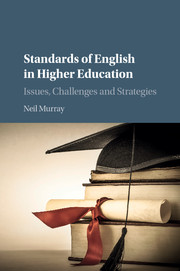Book contents
- Frontmatter
- Dedication
- Contents
- List of figures and tables
- Acknowledgements
- List of acronyms and abbreviations
- Introduction
- 1 The ‘English language question’ in the context of the changing face of higher education
- 2 English language: the need for and impact of policy and regulation
- 3 Seeking definitional clarity: what is ‘English language proficiency’?
- 4 Pre-enrolment language assessment and English language conditions of entry
- 5 Post-enrolment language assessment: challenges and opportunities
- 6 From assessment to provision
- 7 Innovation in English language provision: driving and navigating institutional change
- 8 Innovation in English language provision in higher education: an Australian case study
- References
- Appendices
- Appendix A Good Practice Principles for English language proficiency for international students in Australian universities
- Appendix B English language standards for Higher Education
- Appendix C Accreditation UK inspection criteria (adjusted to reflect the higher education context)
- Index
Appendix A - Good Practice Principles for English language proficiency for international students in Australian universities
from Appendices
Published online by Cambridge University Press: 05 November 2015
- Frontmatter
- Dedication
- Contents
- List of figures and tables
- Acknowledgements
- List of acronyms and abbreviations
- Introduction
- 1 The ‘English language question’ in the context of the changing face of higher education
- 2 English language: the need for and impact of policy and regulation
- 3 Seeking definitional clarity: what is ‘English language proficiency’?
- 4 Pre-enrolment language assessment and English language conditions of entry
- 5 Post-enrolment language assessment: challenges and opportunities
- 6 From assessment to provision
- 7 Innovation in English language provision: driving and navigating institutional change
- 8 Innovation in English language provision in higher education: an Australian case study
- References
- Appendices
- Appendix A Good Practice Principles for English language proficiency for international students in Australian universities
- Appendix B English language standards for Higher Education
- Appendix C Accreditation UK inspection criteria (adjusted to reflect the higher education context)
- Index
Summary
Introduction
The project
The Department of Education, Employment and Workplace Relations (DEEWR) in 2008 funded a project to develop a set of good practice principles for English language proficiency in academic studies.
This project's focus is international students studying in universities in Australia. However, the Principles can be applied more generally to learning and teaching of all higher education students and they can be used by other post-secondary educational institutions.
The project was undertaken by a Steering Committee convened by the Australian Universities Quality Agency (AUQA). A list of Steering Committee members is given on the last page of this document.
The project is a quality enhancement activity for the Australian university sector and reflects extensive work being undertaken in many Australian universities. It builds on the outcomes of a 2007 National Symposium commissioned by the Department of Education, Science and Training. (The outcomes from this Symposium, and the evidence-based background papers that informed discussions at the Symposium, are available from the Australian Education International website at www.aei.dest.gov.au.)
Definition of English language proficiency
For this project, ‘English language proficiency’ has been defined as the ability of students to use the English language to make and communicate meaning in spoken and written contexts while completing their university studies. Such uses may range from a simple task such as discussing work with fellow students, to complex tasks such as writing an academic paper or delivering a speech to a professional audience. This view of proficiency as the ability to organise language to carry out a variety of communication tasks distinguishes the use of ‘English language proficiency’ from a narrow focus on language as a formal system concerned only with correct use of grammar and sentence structure. The project Steering Committee recognises that in many contexts the terms ‘English language proficiency’ and ‘English language competence’ are used interchangeably.
Context
English language proficiency has become an important issue in Australian higher education due in part to a heightened awareness of the role of English language ability in employment outcomes and the role of international graduates in meeting skill shortages in the Australian workforce. There is also an increased recognition within universities of the fundamental nature of language in learning and academic achievement for all students.
The rapid progress of global higher education is prompting universities in other countries to address the complex issues of learning and teaching in multilingual environments.
- Type
- Chapter
- Information
- Standards of English in Higher EducationIssues, Challenges and Strategies, pp. 255 - 268Publisher: Cambridge University PressPrint publication year: 2015

